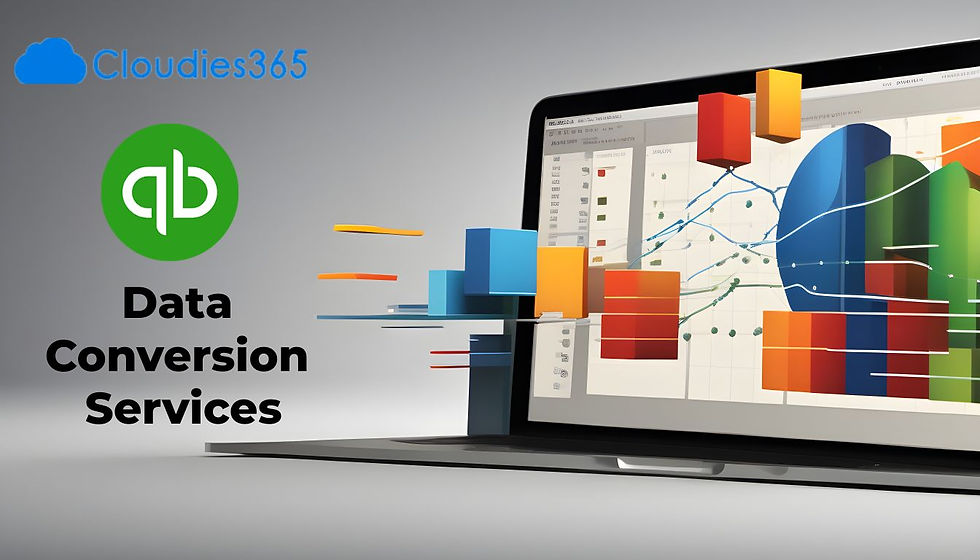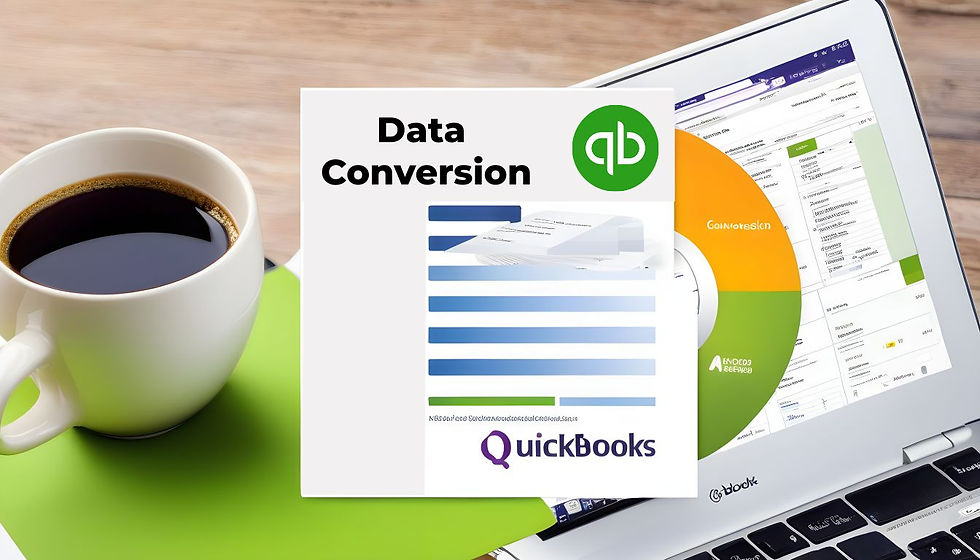How to Migrate from QuickBooks Desktop to Online
- Victor Lee
- Jan 10, 2024
- 9 min read
Welcome to the digital era of accounting! If you're a small business owner or an accounting professional, you've probably heard about QuickBooks - the leading software for managing finances and bookkeeping. But did you know that there are two versions of QuickBooks: QuickBooks Online and QuickBooks Desktop?

In this blog post, we'll explore the benefits of making the migrate from QuickBooks Desktop to QuickBooks Online. We'll guide you through the process of converting your data seamlessly, provide troubleshooting tips for common issues, and offer some valuable insights to help you make the most out of using QuickBooks Online.
So why should you consider switch from QuickBooks desktop to online? Let's dive in and find out!
What is QuickBooks Online
QuickBooks Online is a cloud-based accounting software that allows small businesses and accounting professionals to manage their finances anytime, anywhere. With QuickBooks Online, you can access your financial data from any device with an internet connection, making it incredibly convenient and flexible.
One of the key advantages of QuickBooks Online is its accessibility. Whether you're working from the office or on-the-go, you can easily log in to your account and view real-time financial information. This means no more waiting for updates or being tied down to a specific computer.
Another great feature of QuickBooks Online is its ability to automate many manual tasks. From invoicing and expense tracking to bank reconciliations and payroll management, QuickBooks Online streamlines these processes for increased efficiency.
Collaboration is made easy with QuickBooks Online as well. Multiple users can work simultaneously on the platform, allowing for seamless collaboration between accountants and business owners. This eliminates the need for sharing files back-and-forth via email or USB drives.
Furthermore, QuickBooks Online offers a wide range of integrations with other business applications such as payment processors, e-commerce platforms, and CRM systems. This integration capability enables businesses to streamline their operations by centralizing data across different systems.
QuickBooks Online provides small businesses with convenience through its cloud-based nature, automation features that save time and effort in managing financial tasks, collaboration capabilities among team members within the platform itself ,and integrations that help consolidate data from various sources into one place.
What is QuickBooks Desktop?
QuickBooks Desktop is a robust accounting software that has been trusted by businesses for years. It offers a comprehensive range of features designed to streamline financial tasks and help you manage your company's finances effectively.
With QuickBooks Desktop, you can easily track income and expenses, create invoices and estimates, manage inventory, generate reports, and handle payroll. Its user-friendly interface makes it accessible even for those with limited accounting knowledge.
One of the key advantages of using QuickBooks Desktop is its ability to handle large volumes of data efficiently. Whether you have hundreds or thousands of transactions in your books, QuickBooks Desktop can handle it without compromising performance.
Another notable feature of QuickBooks Desktop is its advanced reporting capabilities. You can generate various financial reports such as profit and loss statements, balance sheets, cash flow statements, and more. These reports provide valuable insights into your business's financial health.
Additionally, QuickBooks Desktop allows for multi-user access so that multiple employees can work on the same file simultaneously. This enhances collaboration within your team and improves efficiency.
QuickBooks Desktop provides a powerful solution for managing your business's finances while offering advanced features to meet the needs of small to medium-sized businesses. However, if you're considering making the switch to a cloud-based solution with added flexibility and convenience - let's explore what benefits await when converting from QuickBooks Desktop to Online!
Benefits of Switching from QuickBooks Desktop to Online
There are numerous benefits that come with migrate from QuickBooks Desktop to QuickBooks Online.
Here are a few key advantages:
1. Accessibility and Flexibility: With QuickBooks Online, you can access your financial information anytime, anywhere, as long as you have an internet connection. This means no more being tied to your office desk or computer! You can manage your business finances on-the-go using the mobile app.
2. Automatic Updates: One of the biggest perks of using QuickBooks Online is that updates and new features are automatically rolled out by Intuit. You don't have to worry about manually installing upgrades or purchasing new versions every year.
3. Collaboration Made Easy: If you work with an accountant or bookkeeper, switching to QuickBooks Online allows for seamless collaboration. You can grant them access to your company file in real-time, making it easier than ever to share data and communicate efficiently.
4. Third-Party Integrations: Another advantage of utilizing QuickBooks Online is its ability to integrate with hundreds of third-party apps and services such as payment processors, inventory management systems, CRM software, and more. This enables you to customize and enhance the functionality of your accounting system according to your specific needs.
5. Data Security: When moving your financial data online, it's natural to be concerned about security measures. However, Intuit takes data protection seriously by implementing advanced encryption technology and multi-factor authentication protocols.
By making the switch from QuickBooks Desktop to QuickBooks Online, you'll gain greater accessibility, automatic updates, improved collaboration capabilities, third-party integrations for enhanced functionality, and top-notch data security measures.
Preparing Your Data for Conversion
Before making the switch from QuickBooks Desktop to QuickBooks Online, it's essential to take some time to prepare your data conversion. This preparation will ensure a smooth transition and minimize any potential issues.
First, you'll want to create a backup of your QuickBooks Desktop data file. This ensures that you have a copy of all your financial information in case anything goes wrong during the conversion process.
Next, review your data and clean up any errors or inconsistencies. Look out for duplicate records, missing information, or outdated entries. Cleaning up your data beforehand will save you time and frustration later on.
It's also important to make note of any custom reports or templates that you use in QuickBooks Desktop. Some features may not be available in QuickBooks Online, so you'll need to find alternative solutions or recreate them manually.
If you have inventory items in QuickBooks Desktop, make sure they are set up correctly before converting. Check that all item details such as prices, quantities, and units of measure are accurate.
Familiarize yourself with the differences between QuickBooks Desktop and Online. Take advantage of free training resources provided by Intuit to learn about the unique features and functionalities offered by QuickBooks Online.
By taking these steps to prepare your data for conversion, you can ensure a seamless transition from QuickBooks Desktop to QuickBooks Online without losing any valuable information along the way.
Step-by-Step Guide for Converting to QuickBooks Online
The Convert from QuickBooks Desktop to Online may seem like a daunting task, but with the right approach and guidance, it can be a smooth transition.
Here is a step-by-step guide to help you through the process:
1. Evaluate your needs:
Before making the switch, assess your business requirements and determine if QuickBooks Online meets them. Consider features like multi-user access, remote accessibility, and automatic updates.
2. Set up your QuickBooks Online account:
Sign up for a subscription plan that suits your needs and create an account on the Intuit website. You'll need basic information about your business such as name, address, industry type, etc.
3. Prepare data for conversion:
Clean up your data in QuickBooks Desktop by reconciling accounts, fixing any errors or discrepancies, and removing any unnecessary transactions or lists.
4. Export data from QuickBooks Desktop:
Use the built-in export feature in QuickBooks Desktop to save company files in .qbb format onto a local drive or network location.
5. Import data into QuickBooks Online:
Log into your newly created account on the Intuit website and navigate to "Company Settings" > "Import Data." Follow the prompts to upload and convert your saved .qbb file.
6. Verify converted data:
Thoroughly review all imported data in QuickBooks Online to ensure accuracy before proceeding further with day-to-day operations.
7. Customize settings:
Modify settings according to your preferences such as chart of accounts structure, product/service list names/categories, tax rates/tax agencies setup etc., ensuring they align with how you manage finances in your business.
8. Reconcile bank accounts:
Connect bank feeds or manually import bank statements into QuickBooks Online so that you can reconcile transactions easily going forward.
9. Train yourself/team members:
Familiarize yourself (and others) with navigating around the QuickBooks Online interface, using features like invoicing, expense tracking, and reporting. Take advantage of Intuit's online training resources.
10. Cancel QuickBooks Desktop subscription:
Once you have successfully migrated to QuickBooks Online and ensured that all necessary data has been transferred, cancel your QuickBooks Desktop subscription to avoid being charged for both services.
Congratulations! You have now successfully converted from QuickBooks Desktop to QuickBooks Online and can start using the software to manage your business finances more efficiently. If you encounter any issues or need further assistance, reach out to Intuit's customer support team for help.
Troubleshooting Common Conversion Issues
Converting from QuickBooks Desktop to QuickBooks Online can be a smooth process, but like any software migration, there may be some hiccups along the way. Here are some common conversion issues that you might encounter and how to troubleshoot them.
One issue you might come across is missing or incorrect data after the conversion. This could happen due to compatibility issues between the two versions of QuickBooks. To resolve this, double-check your data before starting the conversion process and make sure all entries are accurate and up-to-date.
Another common problem is mismatched account balances. This can occur if your chart of accounts in QuickBooks Desktop doesn't align perfectly with the default chart of accounts in QuickBooks Online. To fix this, review your account balances post-conversion and manually adjust any discrepancies.
You might also face difficulties with payroll setup during the conversion process. It's important to ensure that all employee information, tax tables, and payroll settings are correctly migrated from QuickBooks Desktop to Online. If you encounter any issues, reach out to Intuit Support for assistance.
Additionally, some users have reported slow performance or system crashes after converting their data. This could be due to large file sizes or other technical factors specific to your computer system. Consider optimizing your company file size by condensing old transactions or consulting with an IT professional for guidance on improving system performance.
It's crucial not to overlook user training and familiarity with using QuickBooks Online after the conversion. Some users may struggle with navigating the new interface or finding certain features they were accustomed to in Desktop version.
To address this issue effectively designate time for staff training sessions so everyone feels confident using the new platform.
While these troubleshooting tips should help resolve most common conversion issues when switching from QuickBooks Desktop to Online version keep in mind that every situation is unique.
If problems persist don't hesitate contacting Intuit Support for personalized assistance tailored specifically towards resolving your particular challenge. By addressing these issues proactively, you can ensure a successful transition to QuickBooks Online and start taking full advantage of the many features and benefits it offers.
Tips for Successfully Using QuickBooks Online
Here some Tips for Successfully Using QuickBooks Online:
1. Familiarize Yourself with the Interface
To make the most of QuickBooks Online, take some time to explore its user-friendly interface. Get comfortable navigating through different sections and familiarize yourself with the various features available.
2. Customize Your Dashboard
Customizing your dashboard can help you stay organized and efficient. Arrange widgets according to your preferences, such as income and expense trackers, open invoices, or bank account balances. This way, you can easily access important information at a glance.
3. Utilize Automation Features
QuickBooks Online offers several automation features that can save you time and effort. Take advantage of tools like automatic categorization of expenses or recurring transactions to streamline your workflow.
4. Keep Your Data Up-to-Date
Regularly updating your data in QuickBooks Online ensures accuracy in financial reporting and helps you make informed business decisions. Make it a habit to enter transactions promptly and reconcile accounts regularly.
5. Explore Integrations
QuickBooks Online integrates seamlessly with many other software applications that can enhance its functionality further. Look for integrations that are relevant to your business needs, such as payroll processing or inventory management systems.
6. Continuous Learning
Stay up-to-date with new features and enhancements by attending webinars or online tutorials offered by Intuit (the company behind QuickBooks). Continuous learning will help you maximize the benefits of using QuickBooks Online effectively.
Remember, successfully using QuickBooks Online requires practice and familiarity over time! So don't hesitate to experiment with different features until you find what works best for your business needs.
Conclusion and Next Steps
Converting from QuickBooks Desktop to QuickBooks Online can be a game-changer for your business. With the numerous benefits it offers, such as accessibility, collaboration, and automatic updates, making the switch is definitely worth considering.
To ensure a smooth conversion process, make sure you prepare your data properly by cleaning up any errors or inconsistencies. Follow the step-by-step guide provided to transfer your data seamlessly from QuickBooks Desktop to QuickBooks Online.
If you encounter any issues during the conversion process, don't panic! Troubleshooting common conversion problems is relatively straightforward with the help of resources and support available through Intuit. Remember that patience is key when tackling these challenges.
Once you've successfully made the transition to QuickBooks Online, take some time to familiarize yourself with its features and capabilities. Explore different functions like invoicing clients, managing expenses, tracking inventory, generating reports, and more. This will help you maximize all that this powerful accounting software has to offer.
Remember that ongoing education is crucial in mastering any software application. Keep an eye out for new features and updates released by Intuit so that you can continue using QuickBooks Online efficiently while staying ahead of industry trends.
Happy bookkeeping!
Suggested Post:- What Is The Process Of Converting Data?



Comments